The China Project 2020 Red Paper
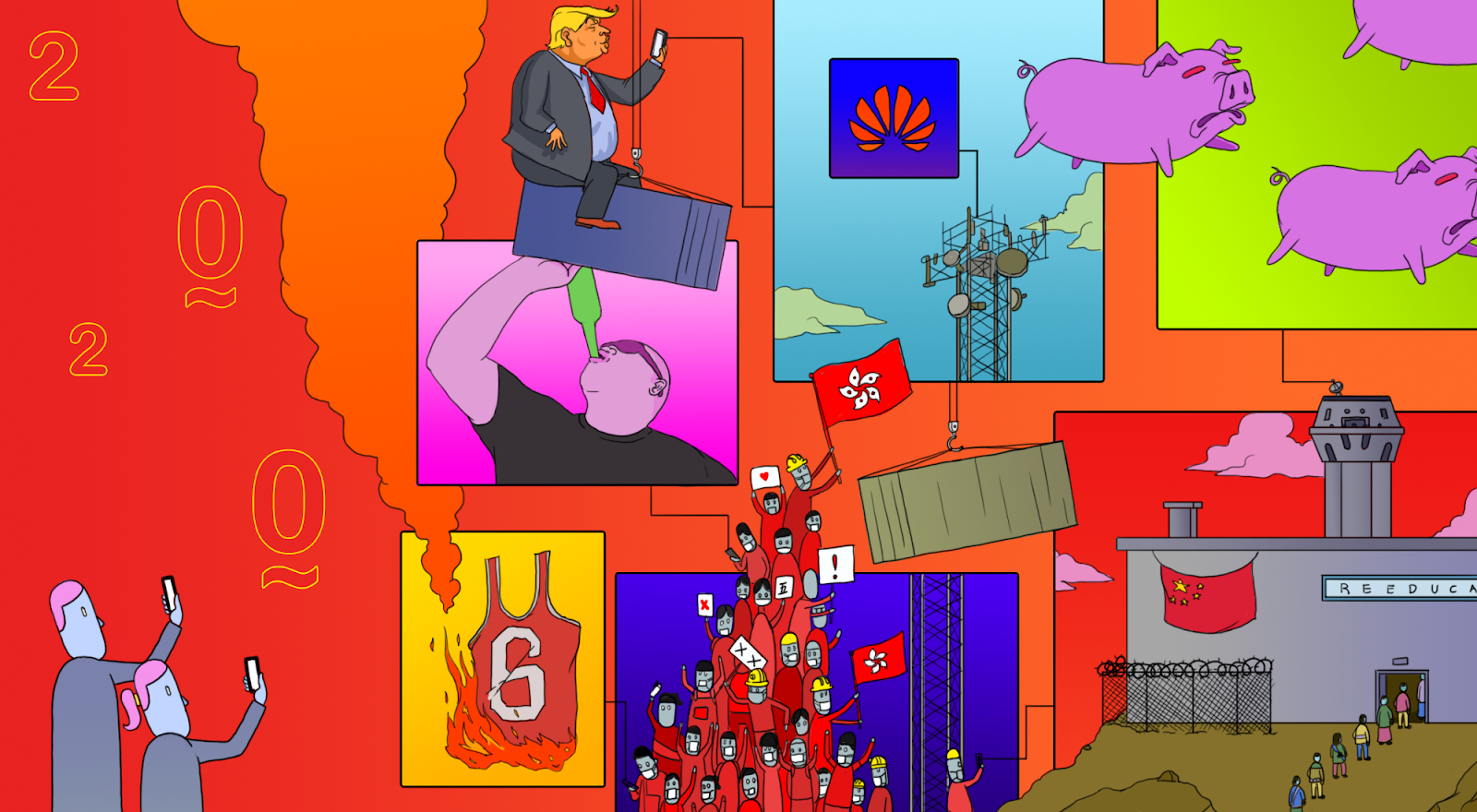
The China Project’s report on what happened in China news in 2019, and where it could all lead in 2020.
Welcome to the The China Project 2020 Red Paper. As with previous entries in our Red Paper series, it summarizes and analyzes the most important news from and about China over the last year, and gives an outlook on the year ahead.
Some stories from 2019 are not covered here because they were previously covered in the 2019 Q1 or Q2 Red Papers, which we released in March and July. In these cases, we have simply linked back to those Red Papers.
If you prefer a downloadable document, we have made a PDF version of the Red Paper available at this link.
Compiled and edited by Lucas Niewenhuis and Jeremy Goldkorn. Thanks also to Alex Smith. All illustrations, including the cover design, by Derek Zheng.
Contents of the The China Project 2020 Red Paper:
Introduction by Jeremy Goldkorn, The China Project Editor-in-Chief
Guide to the top eight stories of the year:
- The U.S.-China trade war comes to a fragile and underwhelming cease-fire
- Hong Kong protesters fight for their five demands
- Chinese authorities continue to crush Uyghurs in Xinjiang despite increasing pushback at home and abroad
- Huawei is targeted by the U.S., but Chinese tech continues to grow globally
- China punishes the NBA, and dozens of other brands, for speech on Hong Kong
- Year of the dead pig: African swine fever wreaks havoc on China’s pork industry
- Countries around the world deal with anxiety about Chinese influence
- TikTok takes over the American teen market but gets caught censoring content
More stories in Business and Technology
More stories in Health, Science, and the Environment
More stories in Politics and Current Affairs
More stories in Society and Culture
Introduction by Jeremy Goldkorn, The China Project Editor-in-Chief
The year 2019 was a fascinating although often depressing year to cover news from China. I hope you find our review of it in this Red Paper useful.
What can we expect from 2020? With apologies to Yogi Berra, it’s tough to make predictions, especially about the future of China. But based on The China Project’s obsessive daily monitoring of trends and news from China, I am going to try anyway. We’ll see how I did this time next year.
What’s in store for China in 2020, the Year of the Rat
An uneasy peace will settle on U.S.-China relations until the 2020 American elections
With American president Donald Trump dodging impeachment and campaigning for reelection partly based on buoyant markets, and Chinese leader Xí Jìnpíng 习近平 battling an economic slowdown, both sides are likely to avoid ratcheting up tensions much further.
But this uneasy peace could be derailed by 100 different things, including:
- Aggressive moves by the U.S. Congress to sanction Chinese tech companies or inflict serious pain on entities and people associated with repression in Xinjiang or Hong Kong.
- An escalation in the South China Sea — possibly because of an accident — leading to conflict between Chinese vessels or aircraft and those of U.S., one of its allies, or a Southeast Asian nation.
- A Congress-driven “financial war” on Chinese companies listed on U.S. stock exchanges, or doing business with U.S. banks, and a reciprocal response from China.
- The U.S. completely cutting off Huawei and other Chinese companies from American technology.
After the American presidential elections, all bets are off. If Trump wins, the restraints are off. If a Democratic Party candidate wins, nobody has any idea what will happen: see The China Project’s 2020 U.S. presidential election China tracker, where a coherent vision for Sino-American relations is conspicuous by its absence.
There will be fintech innovations galore, including a state-backed cryptocurrency
The People’s Bank of China will become the first central bank to launch its own digital currency, as Alibaba and Tencent penetrate deeper and deeper into China’s financial infrastructure. Mastercard, Visa, and any foreign bank or payment company hoping to launch retail operations in China will remain frustrated.
Global investors will “discover” Transsion, Chinese mobile phone king of Africa
Shenzhen-listed Transsion Holdings Co. Ltd. is the dominant vendor of mobile phones in Africa and perfectly positioned to capitalize on the continent’s growing mobile economy.
Chinese 5G and 6G innovation will be a point of pride, subsidized by the government
The rollout of 5G in China began ahead of schedule in 2019. The state will pour financial and propaganda resources to ensure China’s mobile network is the world’s 5G leader, and will incentivize private and state companies to maximize the economic and technological potential of 5G. By the time we’re writing our 2021 Red Paper, 6G will have become a state media buzzword.
Chinese consumers will carry on spending and getting into debt
Chinese young people will continue to consume, and they will increasingly resemble their American counterparts by getting into debt to do so. Cars and mobile phones are two major consumer items that have seen depressed sales in the last year, but the government will do its best to reinvigorate consumer demand with incentives to promote electric car and 5G mobile sales.
Hong Kong will decline into a Chinese Belfast as Beijing pumps money into Macao
Macao’s economy will grow with strong support from the central government. Hong Kong’s financial markets will continue to function more or less as normal, but no one will ever take seriously the city as “Asia’s world city.” Global companies will increasingly look to Singapore and other Asian cities to base their regional operations.
By the end of 2020, the effects of Hong Kong’s slow decline will begin to be noticeable in statistics like GDP, but also in new company registrations and other indicators of eroding business confidence.
The Hong Kong protest movement will not go away. The Hong Kong government, as required by Beijing, will not give an inch, and will use any means — fair or foul — to discredit and demoralize the protest movement. But the city’s contradictions will fester, and by December 2020, pundits will compare Hong Kong with Belfast in the 1980s.
Tsai will be reelected as Taiwan’s president with an overwhelming majority
Tsai Ing-wen (蔡英文 Cài Yīngwén) will be reelected president of Taiwan on January 11, partly because of average citizens’ revulsion at Beijing’s handling of Hong Kong. Tsai will not declare independence, but Xi Jinping will still rattle his sabers. There will be ever louder calls in the U.S. Congress to give greater support and even diplomatic recognition to Taiwan.
Facial recognition will become ubiquitous for travel and retail purchases
Scanning your face to pay will be commonplace in China by the end of 2020. Other countries will begin to adopt Chinese facial recognition and payment technologies.
Several global sports stars will offend the Chinese government
American basketball players, European or South American soccer players, athletes with gold medal records in the Winter Olympics: Someone is sure to offend the Chinese Communist Party with a tweet, an Instagram post, or some other act that hurts the feelings of the Chinese people.
Global meat prices will rise because of Chinese demand
As China struggles to deal with African swine fever, the country will import more and more meat, raising global prices. The swine fever crisis will, however, spur innovation in biotech and drug development to fight the epizootic, as well as investment in plant-based meat substitutes.
TikTok will encounter real trouble in the U.S.
Mark Zuckerberg has given up on trying to get Facebook into China, according to a speech the CEO gave at Georgetown University in October that spun his platform as a values-driven free speech defender. The next logical step is a (perhaps justified) lobbying campaign against TikTok, the only Chinese-made app that has won a significant following among young Americans.
China will heavily promote homemade silicon chips
If there’s one thing China learned from the U.S. in 2019, it’s that Beijing cannot rely on the U.S. for core technology. One of China’s major weaknesses is in the design and manufacture of semiconductors, the silicon chips that power all our digital devices.
In 2020, the Chinese government will invest in, promote, and devote any resources necessary to kick-start a chip industry that is wholly domestic.
The space race will heat up, with state and private players blasting off from China
A lunar colony, further exploration of Mars, and a permanently manned space station: These are China’s short-term aims in space and we’ll hear more about them in the coming year. Naturally, some militarization and experimental shooting down of satellites might also be part of the Chinese space program for 2020.
Protests against China’s Xinjiang policies will grow in Turkey, Indonesia, and Malaysia
Europe and the U.S. will continue to make statements about China’s treatment of Uyghurs and other Muslim minorities, but are unlikely to take serious punitive action. Awareness about the crisis will spread in Muslim-majority countries.
Further academic repression
Schools and universities will continue to be purged of dissenting thinkers and books that carry the wrong ideological message.
New drug and biotech development will accelerate
Chinese scientists will continue to pioneer gene editing and other cutting-edge techniques. At least one new treatment for a major disease will come out of China.
Financial opening continues
Beijing will keep the door open to the financial services industry, inviting large foreign banks, funds, and insurance companies to come in.
Influence anxiety
Australia, Canada, Sweden, and the U.S. will enact or at least debate policies to counter Chinese espionage and political influence operations. Germany, other European countries, and New Zealand may follow.
Guide to the top eight stories of the year
1. The U.S.-China trade war comes to a fragile and underwhelming cease-fire

On December 13, the Office of the U.S. Trade Representative released a statement announcing a “phase one trade agreement” between the U.S. and China. The statement was not modest about boasting of the Trump administration’s achievements:
The United States and China have reached an historic and enforceable agreement on a Phase One trade deal that requires structural reforms and other changes to China’s economic and trade regime in the areas of intellectual property, technology transfer, agriculture, financial services, and currency and foreign exchange. The Phase One agreement also includes a commitment by China that it will make substantial additional purchases of U.S. goods and services in the coming years.
U.S. Trade Representative Robert Lighthizer further claimed that the deal will “nearly double US exports to China over the next two years.”
However, in Chinese state media, a U.S. commitment to cut its tariffs on China is the only concrete commitment in the text. There is also an ominous paragraph that makes clear this is not a done deal yet, as it still requires “legal review, translation and proofreading.”
A clear-eyed analysis of the tentative deal was written by Scott Kennedy, who researches Chinese business and economics at the Center for Strategic and International Studies. Kennedy accurately described the deal as “a fragile and costly U.S.-China trade peace”:
There is still significant ambiguity about what is in the deal but based on what we can surmise, it is unclear if the struggles of the past two and a half years have been worth it. The costs have been substantial and far reaching, the benefits narrow and ephemeral…
…by [the Trump] administration’s own metrics, the trade war has not paid off. Total U.S.-China trade and direct investment have slowed, but these changes reflect the diversion of trade to others, not the movement of manufacturing back to the United States. Moreover, far from abandoning its efforts to achieve technological independence, China is doubling down on what it calls “self-reliance.” The deal’s apparent big winners, U.S. farmers, were not in harm’s way before the trade war, and they likely would have sold just as much in aggregate to China had the trade war never commenced.
Chad Brown, a trade expert at the Peterson Institute of International Economics, calculated that Trump’s tariffs may only be reduced by less than 2 percent, from 21.0 percent to 19.3 percent. This means that the trade war is very much still ongoing, even if hostilities are lessened.
The aim, both U.S. and Chinese government officials have indicated, is to sign the phase one deal in early January, at which point the text of the deal will be made public. At The China Project, we are not holding our breath that this will happen as planned, or that it will change much in the U.S.-China economic relationship compared with the pre-trade-war status quo. It would be surprising to us if the commitments on anything other than agricultural purchases in exchange for tariff reductions are worth writing home about.
However, the reduction in tensions from at least staving off further escalations of tariffs is a welcome change from the past year and a half of spiraling tensions, since large-scale tariffs went into effect on July 6, 2018. The dramatic ups and downs of the first year of the trade war were described in more detail in our Red Papers for last year, Q1 2019, and Q2 2019.
We should all be thankful if the incoherent tantrums of Trump from August are behind us — this is when he declared Xi Jinping an “enemy” of the U.S., said to American companies that they are “hereby ordered” to relocate their operations from China, and was contradicted by both his own White House and the Chinese Foreign Ministry about the status of trade talks.
It was at this nadir in relations that two former Chinese central bankers, Chén Yuán 陈元 and Zhōu Xiǎochuān 周小川, predicted expanded conflict between China and the U.S., including a “financial war.” That remains a distinct risk, even with a partial trade deal in place. Though the Trump administration weaseled away from a proposal in October to limit U.S. investment in Chinese companies, the issue could easily be taken up again if Trump has another tantrum.
Technology, importantly, remains at the center of tensions between the U.S. and China. Right now, the U.S. Commerce Department is reviewing proposed control mechanisms for any technology sale involving “foreign adversaries” (read: China). See Top Story number 4 below on Huawei and Chinese technology for more.
However, with all the trade war turbulence over the past year, it can be easy to overlook the fact that today, it is easier than ever for most businesses — not things like media or nonprofit work, of course, but most businesses — to operate in China.
The World Bank has ranked China as the 31st-easiest country to do business in, up from number 45 a year ago, the South China Morning Post reports. An “eagerness to reform” in areas like access to credit, ease of paying taxes, and dealing with construction permits is cited for the higher ranking.
The reforms are continuing with a new foreign investment law, which Joerg Wuttke, president of the European Union Chamber of Commerce in China, called “surprisingly accommodating to all concerns…we have.”
Two global industries especially benefiting from Beijing’s reforms are the finance and auto industries, and American companies are as eager as any to find ways to benefit.
-
- In finance, majority-foreign-owned ventures have been approved for the first time this year, with S&P Global receiving a license to operate its ratings services in January, and JPMorgan’s asset management arm becoming the first foreign business to take control of its local joint venture in August. PayPal has also become the first foreign payment platform to enter China to provide online payment services, with the approval of its 70 percent equity stake in GoPay (Guofubao Information Technology Co. Ltd.).
- In the auto industry, rules capping foreign ownership are being phased out, and BMW announced a year ago that it would take the opportunity to buy a majority stake in its joint venture with Brilliance China Automotive Holdings. In addition, Tesla this year built the first fully foreign-owned car plant in China.
—Lucas Niewenhuis
2. Hong Kong protesters fight for their five demands
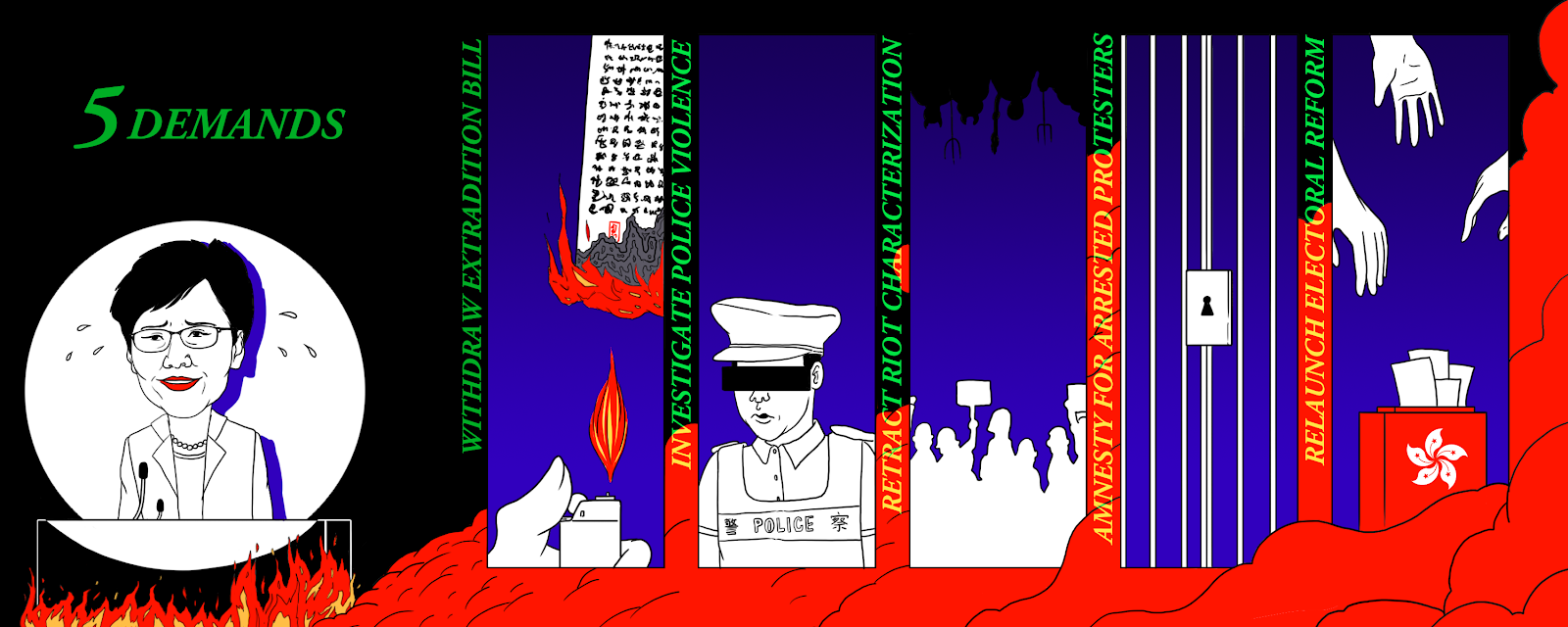
Mass protests began in Hong Kong on June 9, 2019, with over a million taking to the streets to protest an extradition bill that would have connected the city’s judicial system with the opaque and Communist Party–controlled courts of mainland China.
Hong Kong Chief Executive Carrie Lam (林鄭月娥 Lín Zhèng Yuè’é) hedged and obfuscated for three months in response, as two more million-person marches called for the same demand — and more. By the time that Lam finally announced, on September 4, that the bill would be formally withdrawn, addressing police excessive use of force against protesters had instead become perhaps the most important grievance. Older demands from the Umbrella Movement of five years ago, like giving leniency to arrested protesters and finally fulfilling the promise of universal suffrage for the city, have also become central to the protests.
A longer explanation of how the Hong Kong protests developed, and the content of the “five demands,” as they became known, can be found in our explainer: What do the Hong Kong protesters want? The article also contains sections on how Beijing has reacted to the protests, and how mainland Chinese people have reacted to the protests.
Since that explainer was published in mid-November, much has changed in the political landscape of Hong Kong. Here is a brief summary:
- University campuses became battlegrounds in Hong Kong, as police broke a previous unwritten rule about treating them as safe havens. The Chinese University of Hong Kong and other colleges canceled classes for the rest of the semester, as protesters engaged in clashes with police that looked like medieval sieges.
- Hong Kong Polytechnic University remained under siege, with police surrounding the campus and trying to arrest protesters and prevent them from escaping. The standoff continued throughout the week, as more protesters escaped the police lines or surrendered. Other than that one campus, however, November 20 was a rare day of calm in the city.
- The unsustainable stalemate between police and protesters, especially at college campuses, was seen by some observers as a tipping point in Hong Kong.
- A landslide election in Hong Kong swept out establishment figures in the city’s district councils, and was widely perceived as a referendum showing residents are much more upset with the government than with the protest movement. This result not only shattered Carrie Lam’s claim that a “silent majority” of Hong Kong just wants stability and the status quo, but also caught Beijing — or at least state media — by surprise, according to Foreign Policy.
- Beijing denied it had plans to replace Carrie Lam, the Hong Kong chief executive under whose leadership the city has erupted in mass pro-democracy demonstrations. The Financial Times initially reported that “candidates to succeed Ms Lam include Norman Chan [陳德霖 Chén Délín], former head of the Hong Kong Monetary Authority, and Henry Tang [唐英年 Táng Yīngnián], son of a textile magnate who has also served as the territory’s financial secretary and chief secretary for administration.”
- Xí Jìnpíng 习近平 commented publicly on the protests, saying, “Stopping violence, controlling chaos, and restoring order are Hong Kong’s most urgent duties.” State media featured these comments more prominently than any previous coverage of Hong Kong, and a deluge of propaganda articles followed calling for more arrests and stricter punishments for protesters.
- Beijing asserted its authority over Hong Kong’s legal system, with Zāng Tiěwěi 臧铁伟, the spokesperson of the Legislative Affairs Commission of the Standing Committee of the National People’s Congress, insisting that “no other institution has the right to make judgments or decisions” on whether a law is in accordance with the city’s Basic Law. If this becomes a formal position and is enforced, it could fundamentally alter the rule of law and judicial independence of Hong Kong.
- Simon Cheng Man-kit (郑文杰 Zhèng Wénjié), a former employee of the British consulate in Hong Kong who was detained by Chinese security forces in August, claimed that he was tortured by secret police, interrogated, and coerced into making a confession that he had solicited prostitutes.
- Trump signed the Hong Kong Human Rights and Democracy Act into law, which sparked loud words of protest, but largely symbolic actions of retaliation from Beijing. The Chinese Foreign Ministry lambasted the law as a “stark hegemonic practice, and…a severe interference in Hong Kong affairs, which are China’s internal affairs,” while U.S. Navy vessels were banned from visiting Hong Kong and five American NGOs were sanctioned. The law, which has complicated implications for Hong Kong, was not Trump’s idea: The American president had clearly promised to Xi Jinping that he would be quiet on Hong Kong as long as trade talks continued, the Financial Times and CNN both confirmed.
- Beijing appeared to be dialing up its domestic propaganda efforts on Hong Kong following the bill’s passage. In early December, in what appeared to be the first time in six months, there were more stories about the Hong Kong protests and related events on Xinhua News Agency’s Chinese home page than on its English version.
It would be foolish to predict what will happen with the protests in 2020, but the Hong Kong government is unlikely to yield to more demands from the protesters. The rebuke that the Hong Kong government received in the district council elections has probably not fundamentally changed the playbook that authorities are following for dealing with the protests, as described by scholar Sebastian Veg in August: Intimidate protesters with police, use the judiciary for politicized prosecutions, reunite the pro-establishment camp, and turn Hong Kong public opinion against the movement. Scholar and respected commentator on elite Chinese politics Willy Wo-Lap Lam (林和立 Lín Hélì) also gave a cogent analysis of Beijing’s options in the Jamestown Foundation China Brief.
Hong Kong is experiencing the “death throes of a great city,” veteran journalist Ian Johnson wrote, stoking some controversy, but also placing blame at Beijing’s feet for appointing leaders who were consistently “more like colonial governors than autonomous rulers of a dynamic metropolis.”
—Lucas Niewenhuis
3. Chinese authorities continue to crush Uyghurs in Xinjiang despite increasing pushback at home and abroad

Image from a video widely circulated on social media in September that appears to show several hundred prisoners, presumably Uyghurs, blindfolded and shackled, with shaved heads, being lined up for transportation at a railway station in Korla, Xinjiang. Analysis by experts indicated that the video was likely taken by a government drone in August 2018.
This year, Beijing continued its horrifying and abusive policies of coercive “re-education” and cultural assimilation of its Uyghur ethnic minority. Reporting later this year also provided evidence that the crackdown extends to Kyrgyz Muslims in Xinjiang, to Christian Uyghurs and Han Chinese in that region, and to Hui Muslim areas elsewhere in China.
The scholar Darren Byler, who writes the Xinjiang Column on The China Project, spoke to us in August to explain the context and implications of many aspects of the crackdown. The resulting article, China’s ‘social re-engineering’ of Uyghurs, explained by Darren Byler, also contains a roundup of articles about the Xinjiang atrocity since our initial explainer on the topic in August 2018, Re-education camps in China’s ‘no-rights zone’ for Muslims.
We now know that there is at least some internal dissent to China’s hardline policies in Xinjiang, thanks to two extraordinary leaks to the New York Times and the International Consortium of Investigative Journalists.
- The New York Times received over 400 pages of internal Party documents, which showed Xi Jinping demanding “absolutely no mercy” in dealing with those infected with “extremist religious thought.” Regional Party leader Chén Quánguó 陈全国 then issued an order in February 2017 to “round up everyone who should be rounded up,” leading to the arbitrary mass detention atrocity still under way today. Other parts of the documents showed that some officials disobeyed the orders for mass detentions and were punished, and one document was essentially a script that officials were told to follow when interacting with children whose parents had been detained in camps. China did not deny the authenticity of the documents, which were the most significant leaked from inside the Communist Party system in decades.
- The second major leak of Xinjiang-related documents was published by the International Consortium of Investigative Journalists, a week after the New York Times leaks. These leaks confirmed that the Xinjiang authorities run the re-education camps like high-security prisons, and that a sophisticated predictive policing dragnet has targeted Uyghurs throughout China and beyond, among other details. Beijing chose to call the leaks fake news. Bethany Allen-Ebrahimian, who was the lead reporter of these leaks, appeared on the Sinica Podcast to discuss her groundbreaking work.
Internationally, the heat turned up on Beijing, though governments with close ties to China also publicly supported the Xinjiang crackdown more vocally in response.
- In July, the ambassadors of 22 countries signed a joint letter on Xinjiang, addressed to the president of the UN Human Rights Council. The countries signing on included Australia, Canada, Japan, and many Western European countries, but not the United States, which quit its position on the council a year ago. In a direct response, Russia and Saudi Arabia were among 37 countries that expressed support for China’s ethnic policies in Xinjiang as a successful “counter-terrorism and deradicalization” program.
- In September, five human rights groups asked UN Secretary General António Guterres to condemn the Xinjiang abuses. Guterres responded, but somehow avoided using any of the relevant terms, including Uyghur, Muslims, detention, surveillance, or even Xinjiang.
- In October, groups of countries gave dueling statements on Xinjiang at a UN human rights committee. Britain read a statement on behalf of 23 countries that cited “credible reports” of mass arbitrary detentions and targeted persecution of Uyghurs, and Belarus read a statement on behalf of 54 countries that commended “China’s remarkable achievements in the field of human rights.” Afterward, the Chinese foreign ministry mildly rebuked the U.S., but used harsher language for Australia for remarks by that country’s foreign affairs minister, Marise Payne, that China must be held to account for human rights abuses, specifically in Xinjiang.
- Jailed Uyghur scholar Ilham Tohti received the Sakharov Prize for Freedom of Thought, the top human rights prize of the European Parliament. It is the second award given to Ilham by European organizations this month — earlier, the European Council had selected him for the Vaclav Havel Human Rights Prize. When Ilham’s daughter, Jewher Ilham, received the award on her father’s behalf on December 18, the European Parliament also adopted a resolution that strongly condemned China’s human rights abuses.
- The U.S. House of Representatives passed the Uyghur Human Rights Policy Act of 2019 just days after Trump signed off on the Hong Kong bill. The bill aims to “address gross violations of universally recognized human rights” that Uyghurs are currently facing in Xinjiang and calls for “targeted sanctions” against members of the Chinese government responsible for the abuses. China reacted with a series of angry screeds, but does not appear to have a lot of options when it comes to taking further action.
- The U.S. government finally issued sanctions for abuses in Xinjiang. Twenty-eight Chinese companies and public security bureaus are now on the U.S. Commerce Department’s Entity List, and the State Department announced visa restrictions for Chinese officials “who are believed to be responsible for, or complicit in, the detention and abuse of Uyghurs, Kazakhs, or other members of Muslim minority groups.” However, these sanctions were not as sweeping as some activists had hoped, as they did not invoke the Magnitsky Act.
- As with the Hong Kong protests, President Trump has appeared to intentionally avoid this hot-button issue as he single-mindedly pursues his trade deals with Beijing.
Despite the pressure at home and abroad, Beijing appears unswayed in its course toward completely crushing Uyghur identity in China.
- In July, state media proclaimed that Xinjiang is a “model of human rights protection,” even as further compelling reports were published on the extent of the repression of Uyghurs. We also noticed an uptick in propaganda, including some with a domestic component, publicizing the Party line on how wonderful life is for Uyghurs.
- In September, China defended its Xinjiang policies at the UN, as Chinese Foreign Minister Wáng Yì 王毅 raised the issue himself, and told the United Nations Security Council that “the deradicalization measures in Xinjiang…are China’s important contribution to the global fight against terrorism.” This was the first public mention of Xinjiang at the UN Security Council.
This year also brought confirmation that China’s surveillance networks are built to be racially discriminatory and identify Uyghurs as a risky group, and concern was also raised about the coercive DNA sampling of Uyghurs and Tibetans. After the New York Times reported that Chinese scientists are attempting to find a way to reconstruct a person’s facial image from a DNA sample, using Uyghur biometric data in studies, two major scientific journals said they would reevaluate studies that rely on Uyghur or Tibetan DNA samples.
—Lucas Niewenhuis
4. Huawei is targeted by the U.S., but Chinese tech continues to grow globally
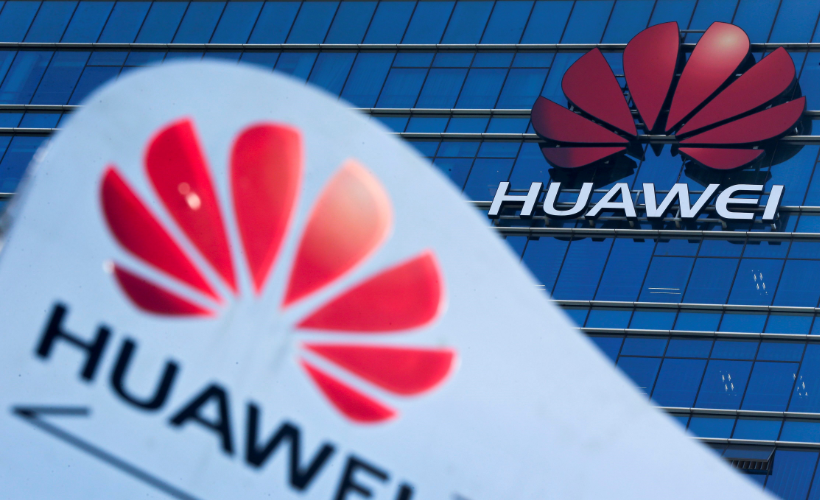
Despite Trump’s bluster about the trade deficit and his repeated bragging about America’s “Great Patriot Farmers” as the primary beneficiaries of his Twitter diplomacy with China, the real center of U.S.-China tensions is technology.
That Washington as a whole identifies technology as a core concern was apparent since the Office of the U.S. Trade Representative released its “section 301” report that rocketed Made in China 2025 to Western media attention, and that Beijing identified technology as a core concern was made most plain by its hostage taking in response to the arrest of Huawei CFO Mèng Wǎnzhōu 孟晚舟 late in 2018.
Huawei has now become a political football in both the U.S. and China, with American politicians piling on to paint it as a centerpiece of Beijing’s plans for global domination and espionage, and Beijing rallying the Chinese population around its telecom giant.
As described in our Q2 2019 Red Paper, May 15 was a dramatic, trajectory-changing day for the U.S. and China, as the U.S. Commerce Department announced on that day that Huawei would be placed on its “entity list.” This meant that no U.S. company would be allowed to sell components to Huawei or its affiliates, a move that represented an existential threat to the company, the Eurasia Group’s Paul Triolo and Douglas Fuller of the City University of Hong Kong wrote on The China Project. Craig Allen, president of the U.S.-China Business Council, later said that the U.S. was trying to “murder” Huawei rather than mitigate perceived national security risks from its technology.
The Commerce Department has since issued three limited reprieves to Huawei, as trade negotiations have been ongoing, but the threat of draconian measures to disengage American businesses from China’s largest telecom company remains.
Washington and Beijing have engaged in aggressive behind-the-scenes diplomacy, threatening damage to ties with countries that don’t treat Huawei products with their favored amount of suspicion or accommodation. Here are just two of many reported examples:
- The Trump administration is trying to strong-arm the U.K. on Huawei, reportedly telling British officials in July that if they don’t fall in with the American line on the Chinese technology company, there won’t be a post-Brexit trade deal.
- China’s ambassador to Germany, Wú Kěn 吴恳, said on November 20, per Xinhua: “Unfoundedly excluding Huawei’s involvement from setting up a 5G network in Germany would be blatant discrimination against Chinese companies and would send the wrong signal of protectionism.” His language has got stronger since then and was called “a blunt threat” by Thorsten Benner, the director of the Berlin-based think tank Global Public Policy Institute.
Huawei, meanwhile, did just fine this year, and the U.S. campaign against the company did not affect its third-quarter revenue: 611 billion yuan ($86 billion), or nearly 25 percent more than the third quarter of last year. Countries from Russia to Kenya have embraced Huawei, and the telecom giant is also benefiting from the early launch of 5G technology in China on October 31.
A domestic controversy was perhaps Huawei’s biggest bump of the year, despite the Trump administration’s best efforts: Early in December, reports emerged of the dismissal and wrongful detention of one of its long-term employees, Lǐ Hóngyuán 李洪元. This story became a scandal for Huawei within China, and many online commenters saw hypocrisy in how Li was treated versus how the company — and the central government — talk about the necessity for fair treatment for the already wealthy and powerful Meng Wanzhou.
Chinese technology as a whole continues to gain market share around the world. For example, Transsion, a Shenzhen-based company, has specialized in the African market, creating cost-effective handsets that have become the continent’s favorite mobile phone brand. Transsion recently applied for an IPO on the STAR market, Shanghai’s new Nasdaq-style board for listings of technology companies.
—Lucas Niewenhuis
5. China punishes the NBA, and dozens of other brands, for speech on Hong Kong
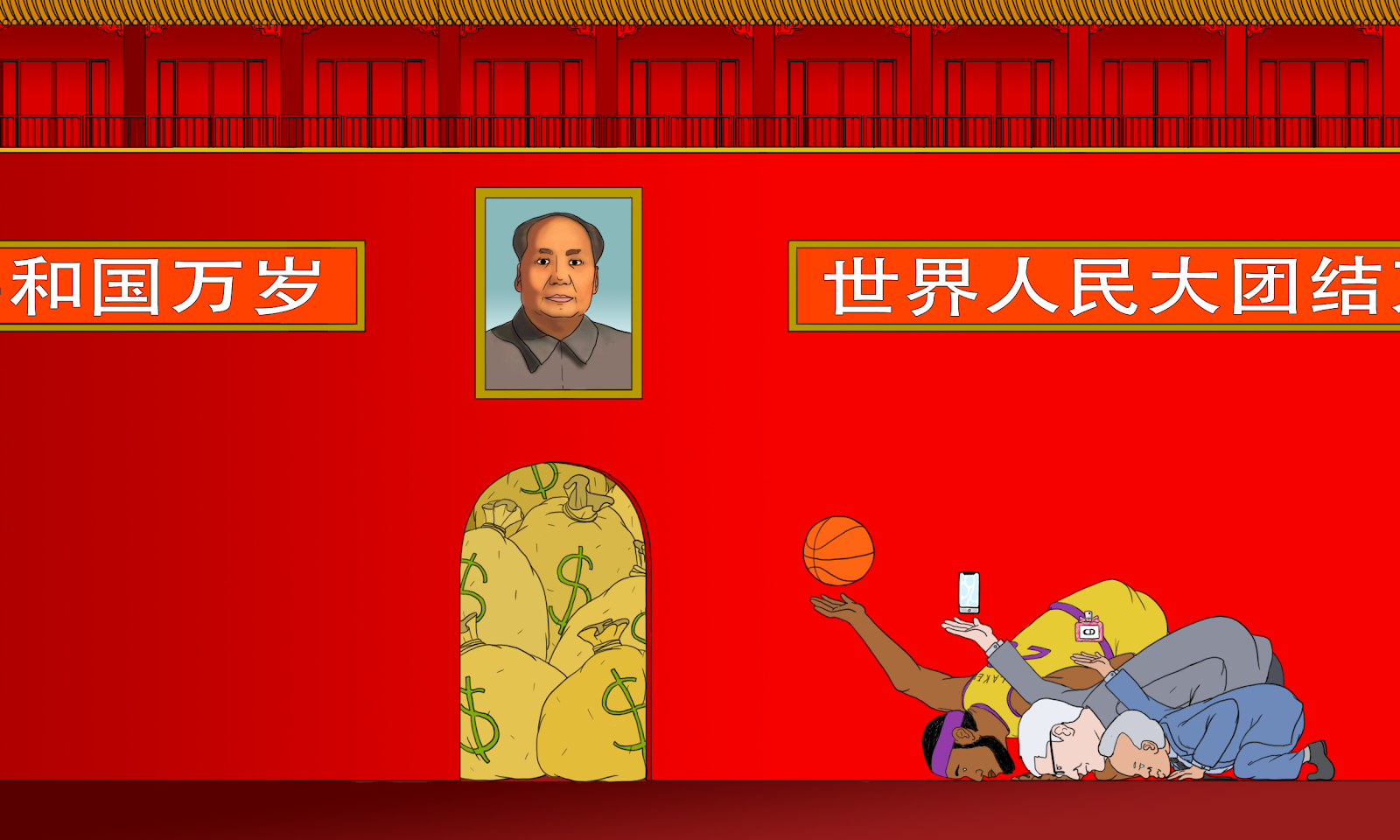
In October, American society had a huge wake-up call about Chinese influence on corporations when the NBA got in hot water over a single tweet. Houston Rockets General Manager Daryl Morey merely posted a message supporting anti-government protesters in Hong Kong, to Twitter — a platform that is blocked in mainland China — which ushered in a firestorm of global reactions from fellow NBA professionals, the Chinese government, many Chinese athletic companies and organizations, and the general populations of both the U.S. and China.
Nearly 170,000 messages, many from almost 5,000 newly created accounts on Twitter, swarmed Morey’s replies at a rate of about two per second, according to a Wall Street Journal analysis. Other data analyses have also strongly indicated that many bots were involved in attempting to shame Morey, though the Wall Street Journal called this more of a “troll mob” because most of the accounts seemed to have real people behind them. It seems extremely likely that this was a Chinese state-backed campaign.
The internet shaming worked, and Morey deleted his tweet. His own boss rebuked him, the Houston Rockets star James Harden said, “We apologize. We love China,” and the NBA issued a groveling apology on Chinese social media that said, “We are extremely disappointed in the inappropriate remarks of Houston Rockets General Manager Daryl Morey. He has undoubtedly severely hurt the feelings of Chinese fans.”
Despite the apologies, the NBA was put in the doghouse anyway, as state broadcaster CCTV canceled all preseason game streaming arrangements, and Tencent — the NBA’s official online partner in China — followed suit. All 11 of the NBA’s official Chinese sponsors also suspended ties with the league. Things have since settled down a bit for the NBA in China, but arguably got even worse in the U.S. — especially with LeBron James saying, to the delight of the Chinese government, that Morey “wasn’t educated” about Hong Kong before his tweet.
In a major address on U.S.-China relations, Vice President Mike Pence bashed the NBA as acting like a “wholly owned subsidiary” of Beijing in its “un-American” censorship of players and employees. It was a follow-up address to his China bash-fest last year, but this time, Pence was less directly critical of China, and even denied that the Trump administration wanted to “decouple” the two countries.
The NBA incident brought into mainstream attention dozens of other incidents when international brands have apologized to China, increasingly for transgressions related to Hong Kong, or otherwise censored or self-censored to maintain market access. In October, The China Project published a list titled All the international brands that have apologized to China, which gives more context and detail to this important phenomenon that is guaranteed to continue for years to come.
—Lucas Niewenhuis
6. Year of the dead pig: African swine fever wreaks havoc on China’s pork industry
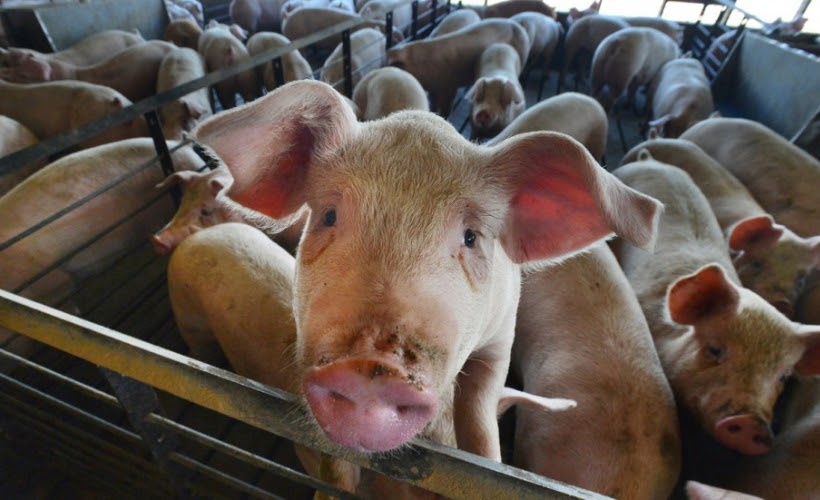
More than a year after the first case of African swine fever was confirmed in China, the epizootic continues to plague the country’s pig population. The disease, which was first confirmed in August 2018 in China’s northeastern Liaoning Province, has since been found throughout all mainland provinces as well as Hainan Island and Hong Kong. The decimation of China’s swine herd has caused dramatic inflation in the price of pork — China’s favorite meat, by far — with knock-on effects making other meat more expensive, too.
While the percentage of pigs that have been wiped out from the disease is staggering — the disease has a nearly 100 percent fatality rate — the exact numbers remain uncertain. In July, China’s National Bureau of Statistics reported that China’s hog herd had been reduced by 15 percent from a year ago, while the Ministry of Agriculture and Rural Affairs estimated the reduction at almost 26 percent from the same time a year ago. Much skepticism remains over the official numbers, with some industry insiders telling Reuters at the end of June that the true death toll of swine fever could be as much as twice the official numbers.
More recent statistics reported in Western media outlets paint a darker picture indeed. In November, New Scientist reported, “Half the pigs in China — which last year numbered 440 million, some 50 percent of the world’s pigs — have either died of African swine fever (ASF) or been killed to stamp out the virus.” The Washington Post reported in October that as many as “half of China’s pigs, an estimated 300 million, have died of the virus or been exterminated” since it was first reported. The Food and Agriculture Organization of the United Nations says that of the pigs wiped out, 1.2 million have been deliberately culled in an attempt to bring the disease under control.
The drop in domestic pig stock has led to a major shortage and price volatility in a country where pork is a dietary staple. Reuters reported in October that pork prices had reached 53.79 yuan ($7.69) per kilogram, a 188 percent increase from the previous year, and have contributed to increased consumer inflation. While prices fell back by 20 percent in November — a response to both falling consumption and Beijing’s decision to release some of its frozen pork reserves onto the market — prices have begun to rise again in early December, following increased consumption in colder weather.
Prices are expected to continue to rise into next year as demand for pork increases as Chinese citizens prepare for Lunar New Year celebrations.
While Chinese Vice Premier Hú Chūnhuá 胡春华 has stated that China must work hard to recover its pig production numbers and stabilize supply in time for the upcoming holidays, impacts are likely to be felt far beyond the upcoming holiday period.
Rabobank has estimated that China’s hog herd will be reduced by 55 percent by the end of 2019, and pork production will continue to drop in 2020.
As John Ferring, managing director at agricultural trading firm Cargill Inc., notes, “This is not a short-term event… This is going to take several years, if not a decade, to fully achieve structural recovery.”
While Chinese authorities have responded by increasing imports of pork and other meats from overseas and by releasing some of its frozen meat reserves onto the market, as Ernan Cui, an analyst with Gavekal Dragonomics, notes, via the SCMP, these measures are at best a partial solution. Any effective longer-term solutions must also focus on increasing domestic supply.
While the central government has invested the equivalent of approximately $15 million in scientific research with the hope of expediting the development of a vaccine (and clamping down on the use of potentially harmful illegal vaccines), experts believe that the discovery of any effective vaccine is unlikely to happen anytime soon. African swine fever is likely to remain a key issue for Chinese authorities and consumers well into the new year.
7. Countries around the world deal with anxiety about Chinese influence

In last year’s Red Paper, we wrote that many countries around the world, particularly liberal democracies but also developing countries, had become increasingly worried about Chinese influence and were “recalculating” their relations with Beijing. This continued in 2019, as the anxieties of governments and citizens about a range of threats from China continued to simmer.
First, there are two largely internet-based dimensions where anxiety about Chinese influence became much higher in 2019.
- Censorship of companies
The best example is the NBA controversy, as described above, but see our list called All the international brands that have apologized to China — an unprecedented number of reported incidents of self-censorship and apologies for hurting the feelings of the Chinese people occurred in 2019. - Disinformation, bots, and trolls
Beijing took a much more front-facing role in spreading fake news in 2019 — and was caught red-handed by Twitter, which banned nearly 1,000 accounts linked to Beijing. Facebook and YouTube followed suit. With Hong Kong, the increased disinformation is understandable, as China wants to do all it can to prevent protests spreading to the mainland. But why did the Chinese Foreign Ministry think it was a good idea to start publishing Trump-esque tweets full of insults, typos, and ALL-CAPS denials of well-documented facts? We may never know.
Next, there are the two dimensions that were most prominent in 2018, but continued in 2019:
- Financial influence and “debt traps”
Developing countries continued to worry about becoming too financially reliant on China, though no country complained as loudly this year as Malaysia did last year. The China Project did its own review of the largely American government-led narrative that China gives out “predatory loans” to set “debt traps” for developing countries and found it to be bunk. - United Front–connected influence operations
The Australian media famously raised the alarm about Chinese political lobbyists with possible connections to the Communist Party’s United Front back in 2017. Since then, the country passed multiple measures aimed at restricting foreign influence in Australian politics, and early this year, the government canceled the permanent residency of Huáng Xiàngmò 黄向墨, who was at the center of many allegations of improper influence. The China debate in Australia continued to stay hot throughout 2019, as in October, a Four Corners report investigated connections between Australian universities and China’s surveillance state, and Prime Minister Scott Morrison was criticized by the opposition Labor Party as having “disturbingly lightweight” ideas on China.
Finally, two long-simmering sources of anxiety about Chinese influence came to something close to a boil this year:
- Chinese students coordinating with diplomats
The club status of the Chinese Students and Scholars Association (CSSA) at Canada’s McMaster University was revoked after concerns emerged about the association’s alleged connections to the Chinese government. The Washington Post obtained evidence that students had coordinated surveillance of a talk by a Uyghur activist with Chinese consulate officials. Later, in August, China’s consulate general in Auckland released a statement praising the “spontaneous patriotism” of pro-Beijing students who reportedly manhandled a Hong Kong–supporting protester at a demonstration at the University of Auckland. This led to a rare rebuke of China by New Zealand government officials. - Spying and espionage
There were some serious incidents of apparent Chinese spies being caught this year. Two prominent cases:- Sòng Xīnníng 宋新宁, director of the Confucius Institute at Vrije Universiteit Brussel, was expelled for spying and is now forbidden from entering Europe’s Schengen Area for eight years.
- The U.S. kicked out two Chinese diplomats for trespassing on a military base.
However, the U.S. government appears to have grossly overreacted to the threat of technology theft from Chinese students and researchers in America — huge numbers of them have reported this year that they now feel racially profiled by the FBI and other branches of the U.S. government, as we documented in our Sinophobia Tracker.
—Lucas Niewenhuis
8. TikTok takes over the American teen market but gets caught censoring content

In our 2019 Red Paper, we noted the rise of Beijing-based Bytedance and its viral short-video app TikTok (known as Dǒuyīn 抖音 in China) as one of the top business stories of the year. TikTok has continued its conquest of the American market, becoming the favorite social media app of teens in the U.S., and recently outperforming Instagram in downloads worldwide.
While a survey over the summer indicated that most American app users had no idea that TikTok is Chinese, that is probably changing. The Guardian revealed in September that the app censors political content closely and in line with Beijing’s priorities, just like Tencent and any other major China-based social media company. This came just a week after the Washington Post reported that all mention of the Hong Kong protests was curiously absent from TikTok, despite the ubiquity of this topic on other social media platforms.
Alex Zhu (朱骏 Zhū Jùn), the head of TikTok, has denied credible reports of censorship on the short-video app, and has also dubiously said that he would turn down requests even from Xi Jinping to censor or hand over data.
TikTok’s censorship problem became dramatically worse when a 17-year-old American Muslim girl found her account suspended after posting a video criticizing the Chinese government’s policies in Xinjiang. The girl, Feroza Aziz, later had her account restored, but not before the New York Times, the Washington Post, and others published feature stories about the incident. TikTok is working to increase the independence of its U.S. operations from its parent company, Beijing-based Bytedance, to stem further controversy.
However, it may be too late for TikTok. Bytedance made its move into the U.S. market by acquiring another Chinese social media company, Musical.ly, two years ago. That acquisition did not attract controversy at the time, but in November, it was reported that the Committee on Foreign Investment in the United States (CFIUS) is conducting a national security review of the deal. Depending on the outcome of that investigation and other potential moves by U.S. lawmakers in Washington, Bytedance could find its room for maneuvering in the American market to be severely limited.
Given the enormous risks for TikTok in the current political environment in Washington, D.C., it made sense when Bloomberg recently reported that Bytedance was considering selling off TikTok. However, Bytedance has dismissed this news as a rumor.
—Lucas Niewenhuis
More stories in Business and Technology
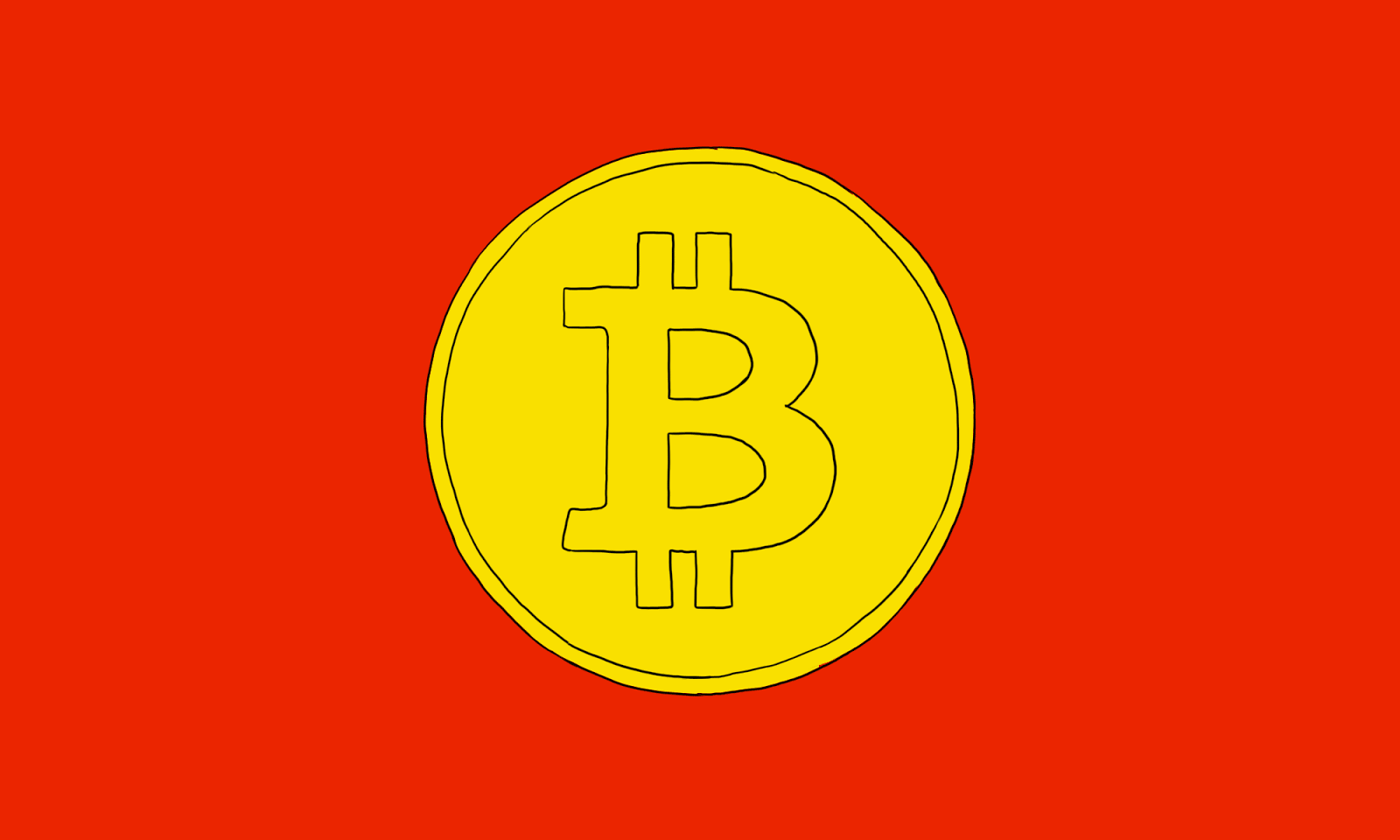
Beijing hyped blockchain technology in late October, with the National People’s Congress passing a new law on cryptography a few days after Xi Jinping gave a speech urging “greater urgency in the development of blockchain technology.” The People’s Bank of China now looks likely to become the first central bank to launch its own digital currency.
Chinese companies continued to promote their facial recognition technology in Africa. The Financial Times notes, “Over the past few years, Chinese surveillance infrastructure has swept across regions from Angola to Zimbabwe.” The paper went on to note, “Data from African markets is of particular interest to Chinese companies, who are looking to improve the accuracy of their facial recognition algorithms, particularly to identify people of color.”
“China’s Corporate Social Credit System is here to stay,” the president of the EU Chamber of Commerce in China, Jörg Wuttke, said, referencing a report by the Chamber and the German consultancy Sinolytics. The consultancy Trivium China also warned about the possibility of Beijing “co-opting technology to enforce political orthodoxy” with social credit, as other companies worried about social credit being used as trade war retaliation.
Alipay has opened its payment platform to foreigners, allowing special accounts to be filled with up to 2,000 yuan ($285) using international debit or credit cards. However, the service didn’t seem to work very well at first.
Mark Zuckerberg has given up on trying to get Facebook into China, according to a speech the CEO gave at Georgetown University in October that spun his platform as a values-driven free speech defender.
The new China rich list is tech heavy: Caixin reports, “Four of the 10 richest Chinese this year came from the high-tech realm.” Jack Ma (马云 Mǎ Yún) nabbed the top spot on Hurun Report’s rich list with $39 billion, followed by Tencent’s Pony Ma (马化腾 Mǎ Huàténg) with $37 billion.
Starting December 1, face scanning was required to apply for new mobile and data services in China, according to a September 27 statement from the Ministry of Industry and Information Technology.
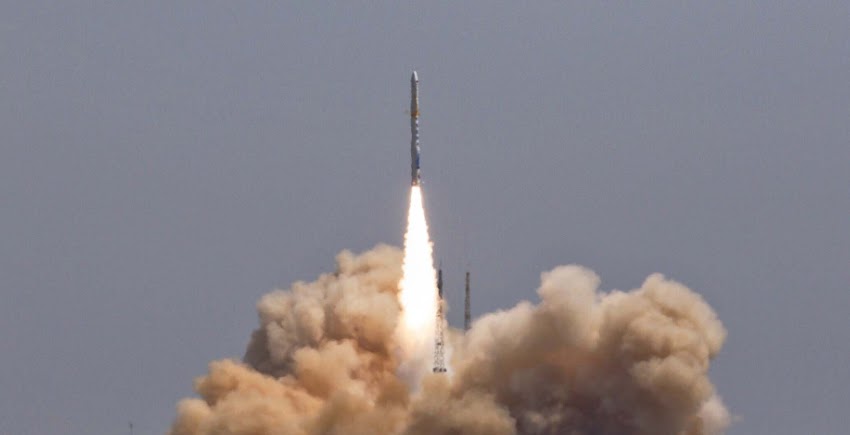
China’s first private satellite launch to orbit was completed by iSpace, a three-year-old Beijing-based startup, on July 25. It is a major milestone for the private space industry in China, which is only five years old.
Beijing Daxing International Airport opened to great fanfare 46 kilometers (29 miles) south of central Beijing. The Zaha Hadid–designed, starfish-shaped air hub could become one of the world’s busiest.
Boeing is betting that China will buy thousands of its aircrafts in the coming decades, but its hopes may be slightly misplaced, as Beijing is increasing its pressure on domestic airlines to use homegrown jets instead.
In a plea for foreign capital, Beijing lifted quotas for its Qualified Foreign Institutional Investor (QFII) and RMB Qualified Foreign Institutional Investor (RQFII) programs in September. The move is partially a symbolic gesture of financial opening, at least for now, because foreign investors had not even reached the previous quota. But commentators also pointed out that it may have been motivated by China “edging dangerously close to twin deficits in its fiscal and current accounts.”
Jack Ma handed over the reins of Alibaba, the ecommerce giant he cofounded 20 years ago, to soft-spoken Daniel Zhang (张勇 Zhāng Yǒng) in September.
A star private equity investor has bet big on Chinese biotech. The Hong Kong–based PAG private equity firm led by Shān Wěijiàn 单伟建 has paid $540 million for a controlling stake in Hisun BioRay Biopharmaceutical. Hisun Pharma is best known for co-developing an Ebola remedy, and is at the leading edge of China’s emerging power in pharma and biotech.
Dozens of biotech startups are looking to list in Shanghai or Hong Kong in the coming months, according to Nikkei Asian Review, the latest news in the boom in Chinese biotech. In related news, the pharma behemoth AstraZeneca is raising $1 billion for a new fund in China to invest in Chinese healthcare startups.
Baidu dropped out of China’s top five internet companies by market cap, and its former status as one of the “big three” Chinese internet firms — Baidu, Alibaba, Tencent — is history.
STAR, the new Nasdaq-style stock market, launched in Shanghai on July 22, and got off to a booming start in its opening hours. But that did not last long, as many of the first batch of companies saw steep declines after listing.
Chinese companies have nearly reached parity with the U.S. on the 2019 Fortune Global 500, which featured 119 corporations from China (not including 10 from Taiwan), while 121 companies from the U.S. were on the list.
Google has “terminated” its censored search engine project, Google executive Karan Bhatia said. There are still at least five different areas in which Google works in China: artificial intelligence research, cloud computing, hardware, app development, and advertising.
IBM is facilitating the construction of China’s surveillance state, through a collaboration that includes the Chinese company Semptian, which is working to “enhance the capabilities of internet surveillance and censorship technology.” This is not IBM’s first questionable collaboration.
Members of the Rothschild family launched a wine in Shandong Province, called Lóng Dài 珑岱 and worth 1,100 yuan ($160) a bottle, which was set to go on the market in September. The original Château Lafite Rothschild wine from France is among the most expensive in the world, making it a highly sought-after — and counterfeited — product in China.
ZhongAn Online Property & Casualty Insurance is offering a variety of innovative insurance policies, capitalizing on people’s worries about events like children going missing or vaccines being ineffective.
A $126 billion stimulus: China’s central bank reduced the amount of cash reserves banks are required to hold as of September 16. The move was expected to free up an additional $126 billion in liquidity in the banking system and encourage spending. Bloomberg pointed out that the September cut was larger than cuts made earlier in the year, while the New York Times observed that the move reflected the government’s willingness to back off on its years-long deleveraging campaign to reduce debt and financial risk in the economy.
To boost domestic consumption, the State Council announced 20 proposed measures in August, including giving out licenses for night markets to operate and encouraging customers with parking facilities and other infrastructure.
More stories in Science, Health, and the Environment

Sea level rise threatens tens of millions in China’s coastal cities, a new study with more accurate measures of land elevation claimed. Besides mass relocations of people, there are defensive measures like levies that will have to be built to deal with this problem in the long term as climate change worsens. Despite the worsening threat of climate change, the long-rumored emissions trading scheme has still not come to fruition, indicating that climate change does not appear to be a policy priority of the government at the time.
Shanghai is getting serious about garbage sorting and recycling, with a first-in-the-nation program that began on July 1 that requires companies and government organizations to sort waste into four categories. Shanghai residents are still struggling to understand the garbage-sorting rules.
Three cases of bubonic plague caused panic in Beijing, partially due to the Party’s habitual lack of transparency, though antibiotics have largely removed the threat of a plague pandemic.
Another report of organ harvesting: A report by the Sydney Morning Herald reviewed some of the existing evidence supporting claims that China has long been involved in widespread organ harvesting. While the report does not provide any new proof, it does make a compelling case that options to “pre-book” an organ transplant with limited wait time provide grounds for further investigation.
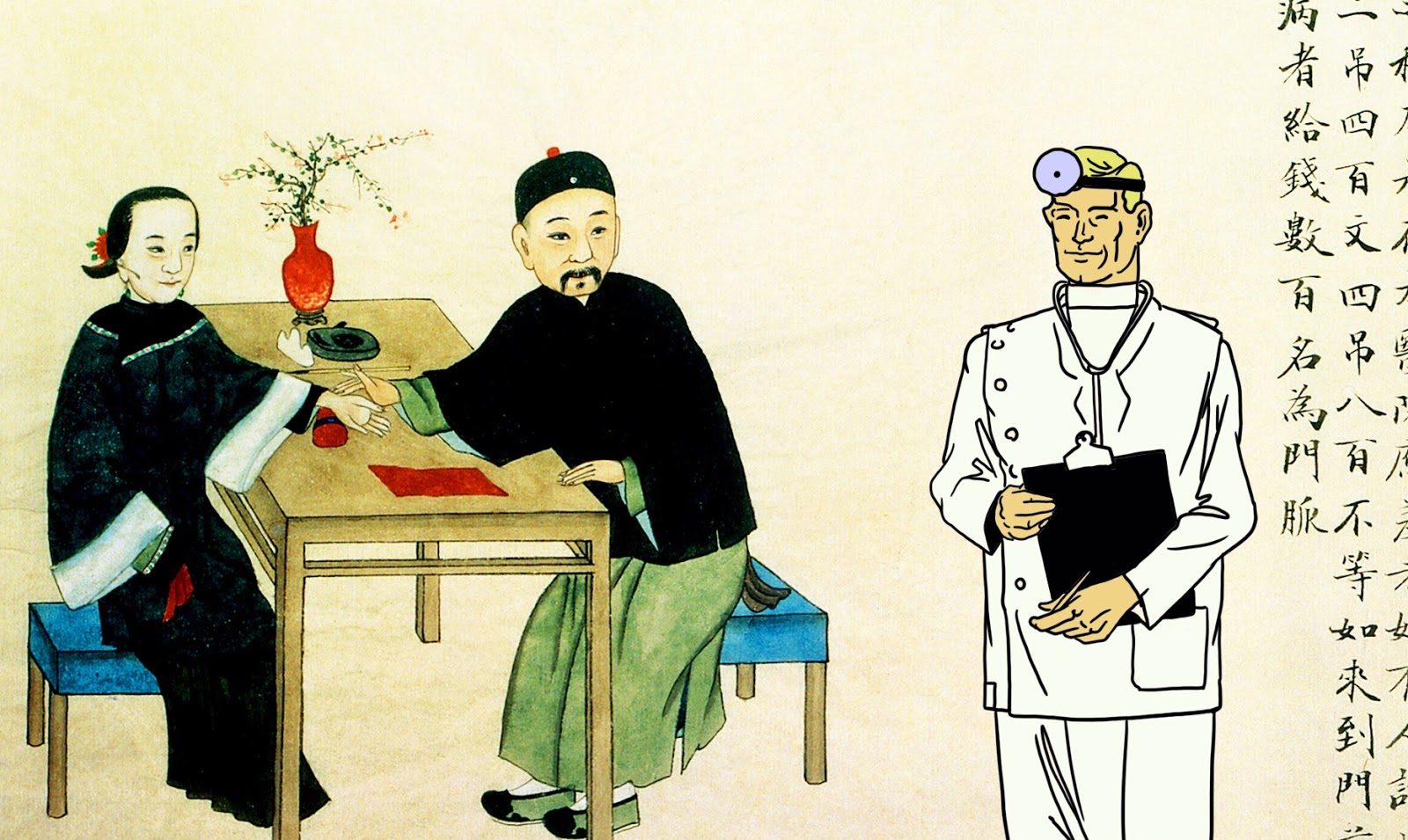
Eight Chinese schools were kicked out of the World Directory of Medical Schools because they teach traditional Chinese medicine (TCM), not medicine. Other schools that teach both medicine and TCM retained their certification. The incident reignited debates about TCM on the Chinese internet, and gave much fuel for trolls.
The threat of traditional Chinese medicine to endangered wildlife: Following the World Health Organization’s decision to include a supplementary section on traditional Chinese medicine in its disease manual, European medical experts issued a joint statement cautioning that doing so risks promoting unproven treatments. The statement noted, “Concepts of body and disease used in TCM have not been substantiated by conventional scientific investigation.”
Staff at a hospital in Zhenjiang, Jiangsu Province, have been suspended for allegedly selling medical products used by Singaporean Mandopop singer-songwriter JJ Lin (林俊傑 Lín Jùnjié) during his stay at the facility.
Heparin, a heart disease drug, may face shortages because of China’s African swine fever epizootic. The active ingredient of the drug is sourced from pig intestines, and as many as 200 million pigs in China may have died from the disease.
A Spanish researcher claimed to be making human-monkey hybrids in China, according to a translation of a Spanish newspaper report in the MIT Technology Review. Juan Carlos Izpisúa Belmonte, a Spanish-born biologist, “has been working working with monkey researchers in China…to fashion animals that possess organs, like a kidney or liver, made up entirely of human cells. Such animals could be used as sources of organs for transplantation…” Such ethical boundary-pushing genetic research could likely only happen in China.
Scientists at Peking University have developed a gene-editing technique that, they say, greatly improves on the current industry standard of CRISPR-Cas13. Hè Jiànkuí 贺建奎, the scientist who crossed ethical lines last year by altering the genetic code of real human babies, received a 3-year prison sentence on December 30.
Researchers have nearly eradicated an invasive mosquito species from two islands in Guangzhou, in an experiment that could have major implications for the global fight against malaria.
More stories in Politics and Current Affairs
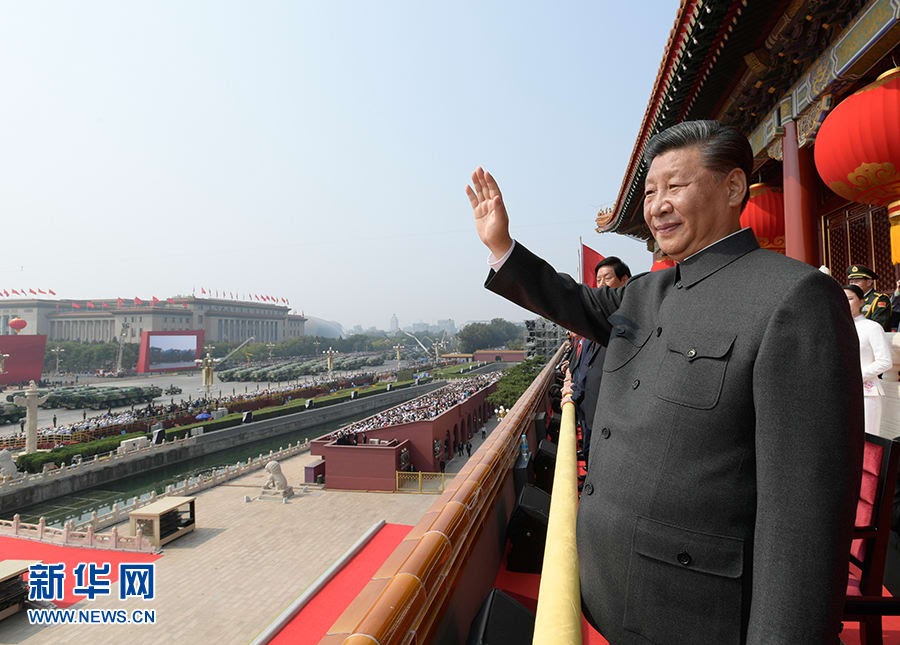
Beijing celebrated National Day on October 1 with a massive military parade, featuring 15,000 service members and powerful new equipment such as the DF-41 hypersonic missile and the DF-17 ballistic missile-launched hypersonic glide-vehicle. General Secretary Xí Jìnpíng 习近平 also gave a speech in which he declared, “No force can ever undermine China’s status,” and urged the uniting of “all of China’s children,” including those across the Taiwan Strait — an idea that Taiwan immediately rejected. On the day after the 70th anniversary of the People’s Republic of China, state media unveiled a new slogan: “A new era of striving” (奋斗新时代 fèndòu xīn shídài).
Xi Jinping has a new favorite word: struggle or striving (斗争 dòuzhēng). He and state media have used the word with increasing frequency since the middle of the year, indicating the pressure that Beijing feels to handle economic headwinds. It also continues Xi’s campaign of directly linking himself to China’s revolutionary leaders, including and especially the former chairman Mao.
Beijing’s biggest security worry is separatists, according to a white paper titled “China’s National Defense in the New Era.” The strategy document is the first to be publicly released since 2015. Separately, the rapid expansion of China’s defense industry was shown in a ranking of the top 100 biggest defense companies in the world by Defense News, where six out of the top 15 are now Chinese.
China criticized India’s decision to unilaterally revoke the autonomous status of Jammu and Kashmir, the Indian-contolled section of disputed territory that borders Pakistan-controlled Gilgit-Baltistan. One section of the territory in question happens to share a border with China.
Xi Jinping visited India and Nepal. In India, Xi and Prime Minister Narendra Modi avoided sensitive political topics like Kashmir or their own disputed borders, and instead released upbeat statements about improving economic links. Xi became the first Chinese president in 22 years to visit Nepal, and inked a deal for a rail link with Tibet. However, the Himalayan nation did not agree with China on an extradition treaty, defense, and border road construction, amid worries of infringement on Nepal’s sovereignty.
The China model? China published an official white paper in September (Chinese version), titled “China and the World in the New Era.” In a departure from the Party line that China does not seek to impose its model on other countries, the paper asserts that China “is providing more public goods to the international community as well as experience and reference for other developing countries.”
Chinese diplomats continued to tweet aggressively. Despite the fact that Twitter is banned in China, the Chinese Foreign Ministry made its own Twitter account and began publishing surprisingly Trump-esque tweets full of insults, typos, and ALL-CAPS denials of well-documented facts. Zhào Lìjiān 赵立坚, a diplomat who cut his Twitter teeth as the second-ranking official at China’s Pakistan mission, was rewarded for his Twitter diatribes with a promotion.
Xi Jinping’s cousin Ming Chai is a high roller at Australia’s Crown Casino, it was revealed in an investigation by the Australian 60 Minutes TV show, and the newspapers The Age and Sydney Morning Herald. The Chinese name of Ming Chai, Qí Míng 齐明, was later published by the overseas Chinese website Mingjing. A Wall Street Journal reporter, Chun Han Wong, a Singaporean national, was soon expelled from China for digging into the story on Ming Chai.

State media employees are to be tested for loyalty, via the “Xi Study Strong Nation” (学习强国 xué xí qiángguó) app on Xi Jinping Thought, according to the South China Morning Post. Meanwhile, a campaign to “raise people’s sense of fulfillment, happiness and security in cyberspace” focused on — what else? — spreading Xi Jinping Thought.
China banned individual travel to Taiwan starting on August 1, in a surprise announcement that the government and state media later made clear is aimed at punishing Taiwanese president Tsai Ing-wen (蔡英文 Cài Yīngwén) and the Democratic Progressive Party (DPP) that she leads. Tsai had been on a global tour branded as the “Journey of Freedom, Democracy, and Sustainability,” and had visited the U.S., the Caribbean, and the U.K.
Tsai gave Beijing the middle finger in New York: Taiwanese President Tsai Ing-wen (蔡英文 Cài Yīngwén) gave a speech during a July visit to New York. The speech follows a $2.2 billion sale of arms and military equipment from the U.S. to Taiwan. Tsai’s speech emphasized that “Taiwan will never succumb to any threats [from Beijing], now or in the future” when it comes to Taiwan’s pursuit of joining the United Nations.
Another Taiwanese citizen was detained in China, this time, a person with a Ph.D. degree from Xiamen University who was heavily involved in promoting closer cross-strait relations. Previously in 2017, Lee Ming-che (李明哲 Lǐ Míngzhé), a democracy activist, was detained, and he remains locked up today.
The Solomon Islands ditched Taiwan, after weeks of speculation. After Kiribati also switched its relations to Beijing, Taiwan only counted four Pacific island nations among its 15 remaining diplomatic partners: Tuvalu, Palau, the Marshall Islands, and Nauru.
Tanzania rejected and revised five demands from China Merchants Holdings International. The Beijing-based company had been contracted in 2013 to build a $10 billion port and economic zone at Bagamoyo, but the Tanzania Ports Authority says that terms such as the lease length and tax status were “commercially unviable.” Tanzania now wants to reserve its right to develop other, competing ports, and to subject any business China Merchants starts within the port to regular government approval processes.
China took issue with Zimbabwe’s accounting of how much bilateral aid Beijing had given the country. Zimbabwe’s official numbers showed only $3.6 billion of its foreign aid came from China, while Beijing claimed the number was 40 times higher.
The man who claims to be a defected Chinese spy appears to have some holes in his story, several Australian scholars said of “William” Wáng Lìqiáng 王立强.
Xi Jinping visited Greece in November, where officials made friendly noises about the start of a “new era,” and agreed on new Chinese energy investments in Greece. Xi also offered to help Greece retrieve the contested Parthenon Marbles from the U.K., where they are kept at the British Museum, despite decades of Greek complaints.
Xi also went to Brazil, where he schmoozed with President Jair Bolsonaro, who gladly returned the favor despite his fiery rhetoric about China on the campaign trail last year. Brazil was rewarded with a billion-dollar investment in the port of Sao Luis via China Communications Construction Company.
French President Emmanuel Macron visited China in November, bringing a delegation that included EU officials, and coming away with deals worth $15 billion. Xi Jinping schmoozed with Macron and other foreign dignitaries in Shanghai, where he also preached openness at the second China International Import Expo.
New Zealand and India took opposite stances on trade with China, as the former country agreed on an upgrade to its bilateral free trade deal, and the latter pulled out of the Regional Comprehensive Economic Partnership (RCEP) in November.
Pakistan secured more funding from China for the China-Pakistan Economic Corridor (CPEC), including for upgrades for the Main Line 1 (or ML-1 or the Karachi-Peshawar Railway Line). A border fence will also be built where Pakistan meets Afghanistan and Iran, though it is unclear whether China will pay for that.
Deutsche Bank hired “more than 100 relatives of the Communist Party’s ruling elite,” despite their lack of qualifications, according to a New York Times investigation. The bank has reportedly gone to great lengths to curry favor with former premier Wēn Jiābǎo 温家宝, and even offered jobs to the children of two current Politburo Standing Committee members, Wāng Yáng 汪洋 and Lì Zhànshū 栗战书 — even though Li’s daughter was “judged unqualified for the bank’s corporate communications team.”
China is responsible for a cyber attack on the Australian parliament and three political parties, according to Australia’s cyber intelligence agency, the Australian Signals Directorate, Reuters reported. But the Australian government reportedly covered up the attack “to avoid disrupting trade relations with Beijing.”
Economic reforms were announced in September, though Chinese-language state media sources made clear these reforms had nothing to do with political liberalization. One interesting reform involves restricting the production of some plastic products to increase sustainability.
Chinese-Australian writer Yáng Héngjūn 杨恒均 was charged with espionage, after eight months of detention. He now faces a possible death sentence, and has pleaded for help from the Australian government. In response, Australian Prime Minister Scott Morrison has called the espionage charge “absolutely untrue,” and said, “We do expect Australians, indeed all citizens, to have their human rights appropriately looked after.”
The Unirule Institute of Economics has been officially shut down, leaving essentially no independent think tanks operating in China. At around the same time that Unirule was being finally shut down, another group of scholars was presenting papers at the first “China International Frontier Education Summit,” held in Beijing in July. They claimed that after years of research, they had discovered that the English language and Western culture actually come from China.
Ninety percent of Canadians have negative impressions of China, and sixty percent of Americans feel the same way, according to new survey data. World opinion on China has also become more negative overall, according to the Pew Research Center’s annual Global Attitudes Survey. Canada and Sweden had some of the biggest drops in favorable opinion on China, though public opinion in Indonesia, the Philippines, and Tunisia also soured considerably.
Iran is offering a visa waiver program to Chinese tourists, in a bid to attract up to one million Chinese people to pump up the local economy, as it has been hit badly by U.S. sanctions.
Trump urged China to interfere in the U.S. election by investigating his chief political rival, Joe Biden, and his son Hunter, who has done business in China. But as the New York Times puts it, “the president’s claims bear little if any relation to the known facts.”
“China is not an enemy,” dozens of China scholars, diplomats, businesspeople, and think tank/government types argued in an open letter in July. There was a backlash, of course, and a garishly patriotic competing open letter. John Pomfret, the veteran journalist and author of a book on the history of U.S.-China relations, also wrote a critical response in the Washington Post.
The coast guards of China and Vietnam had a week-long confrontation, but Xi nevertheless hosted and schmoozed Chairwoman of the National Assembly of Vietnam Nguyen Thi Kim Ngan.
Lǐ Péng 李鹏, the former premier widely known as the “Butcher of Beijing” for his order of martial law that brought a bloody end to the 1989 Tiananmen protests, died at 90 in Beijing on July 22.
More stories in Society and Culture
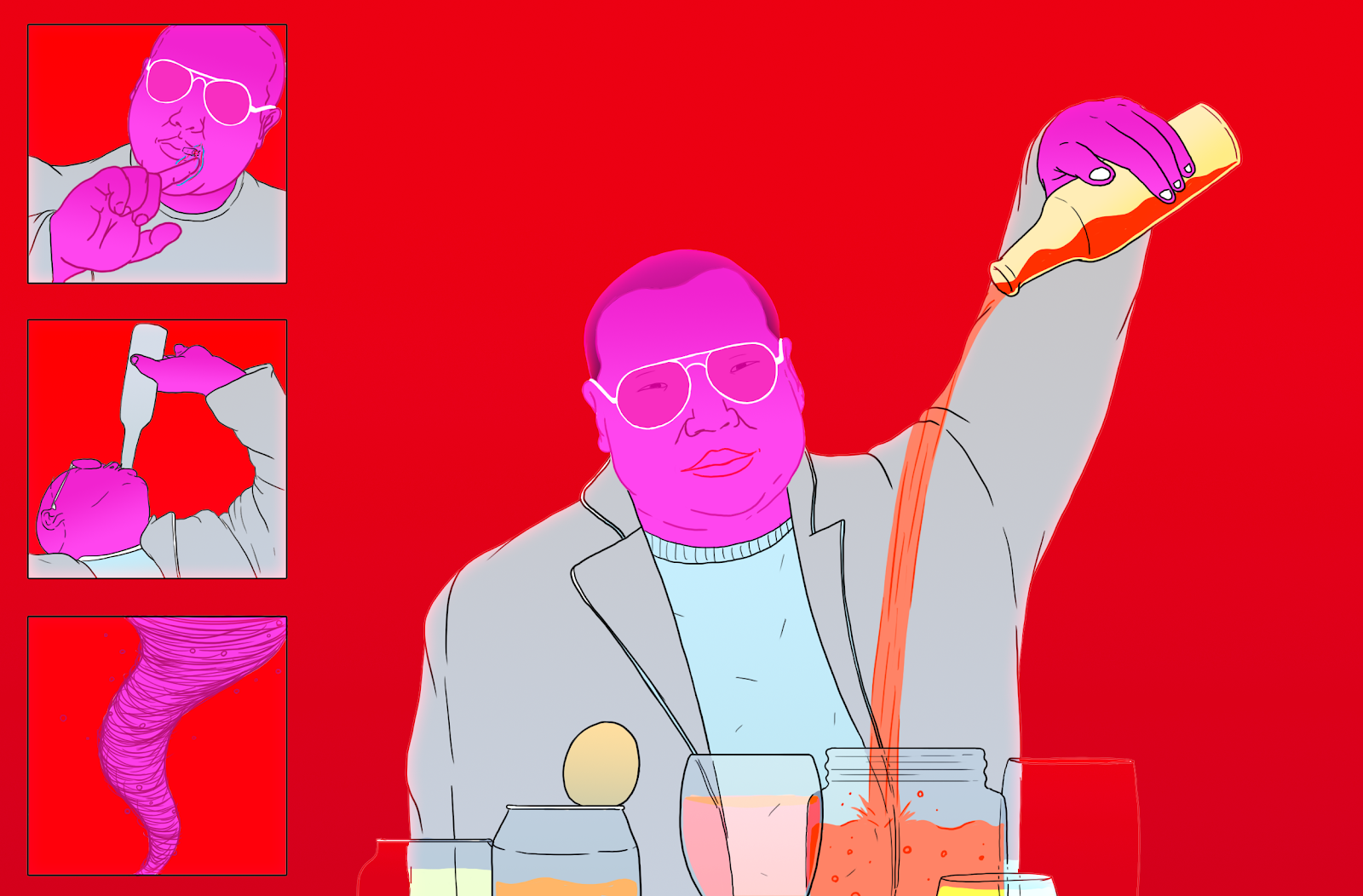
Liú Shìchāo 刘世超, a farmer from rural Hebei, went viral on Twitter for developing his own style of what Deadspin dubbed “stunt drinking.” The self-described Hebei Fatty (河北胖仔 Héběi pàngzǎi) has done more for China’s soft power this year than the billions the Party wastes on CGTN and the China Daily. One particularly touching moment from Pangzai’s initial splash online was when he asked his fans to share childhood memories.
The government is starting to take sexual harassment seriously: An August update to China’s Civil Code will no longer limit provisions covering sexual harassment to places of employment, and the topic was the subject of the top opinion piece (in Chinese) on the People’s Daily website. Later, in December, China’s top education authority promised to act against sexual assault and harassment on college campuses, saying that educators who face allegations of sexual misconduct would face stronger consequences in the future.
But the government still cannot tolerate independent activism from feminists: Sophia Huáng Xuěqín 黄雪琴 was detained in October for “picking quarrels and provoking trouble,” a vague charge that can carry up to five years in prison. Huang has played an instrumental role in the #MeToo movement in China.
In the first court ruling punishing sexual harassment on public transport, Shanghai sentenced a man to six months in jail for groping an adult woman and an underage girl on a subway train. In related news, the head of a TV station at Central South University (CSU) in Hunan Province is under investigation for alleged sexual assault.
A Tibetan hip-hop duo, Anu, has gone mainstream across China with its single “Anu,” which is also one of the most popular songs in Tibet in recent years.

Women initiate over 70 percent of divorces in China, Zhōu Qiáng 周强, president of the Supreme People’s Court, revealed in November. This contrasts with long-held assumptions that Chinese women tend to endure unhappy marriages due to societal expectations and economic pressures.
The Beijing Bookworm closed in November, due to the city’s “ongoing cleanup of ‘illegal structures’” and what the owners described as an inability to “secure an extension of our lease.” For more than a decade, the destination — an English-language bookstore, library, café, and host of the capital’s only real international literary festival — has been a public hub of intellectual life, fostering dialogue and bridging cultures. Beijing will be poorer for The Bookworm’s absence — but hopefully, it will find a new home somewhere else in the city soon.
A 13-year-old boy in Dalian, Liaoning Province, was sent to a juvenile correctional facility in October for a three-year term — the maximum allowed under Chinese law — after sexually assaulting and killing a 10-year-old girl in October. Many Chinese internet users would rather have seen the boy receive a death sentence.
Thirty-nine people who were found dead in a truck in the U.K. in October turned out to be all Vietnamese, not Chinese, although some may have been traveling on falsified Chinese passports.
Michelin’s first guide to the Beijing food scene was panned in an essay by celebrity chef and Da Dong restaurant group founder Dǒng Zhènxiáng 董振祥, for oozing “cultural superiority” and implying that the “culinary level of ordinary people in China remains on tripes, offal, and viscera.”
Shocking homophobic comments were made by the director of the Center for Disease Control and Prevention in Beijing’s Dongcheng District, who was subsequently lambasted on social media.
Bei Bei the panda — born at the National Zoo in Washington, D.C., four years ago — left the U.S. in November for Chengdu, China, where he will stay.
A tiny hole-in-the-wall about a 10-minute drive from Tiananmen Square in Beijing sold for over a million yuan (1.28 million yuan, or $182,400), mostly because it comes with an urban residency permit that is required to access practically every public service in the city.
Censorship of the visual arts is worsening, if the experience of a canceled gallery show at the UCCA Center for Contemporary Art in Beijing is any indication.
Three countries objected to a scene in a movie, Abominable, co-produced by DreamWorks Animation and Shanghai-based Pearl Studio, which shows China’s South China Sea claims via the nine-dash line in a scene. Vietnam pulled the movie entirely, Malaysia censored the scene in question, and the Philippines foreign minister called for the scene to be cut and for the film to be boycotted.
Wáng Shūpíng 王淑平, the HIV whistleblower from the early 1990s who has lived for the past 18 years in the U.S., died on September 21. She was harassed by Chinese officials until the day she died.

The Beijing 2022 Olympics have mascots: Bing Dwen Dwen (冰墩墩 bīng dūndūn), a panda who looks totally spaced out, and Shuey Rhon Rhon (雪容融 xuě róngróng), a red lantern baby, will represent the 2022 Beijing Winter Olympic and Paralympic Games, respectively.
The sexist music of Yán Lìfēi 闫立飞, whose titles include such gender-stereotype-reinforcing hits as “Mom, Don’t Go to Work,” was loudly criticized by Chinese internet users in September.
A single mother in Shanghai is fighting for maternity benefits in a lawsuit against the Shanghai Social Insurance Management Center. The high-profile case was taken up by the city’s highest court in September.
Dài Tiěláng 戴铁郎, the animator who created the beloved Black Cat Detective (黑猫警长 hēi māo jǐngzhǎng) cartoon in the 1980s, died at age 89 on September 4.
American Factory, a documentary about Fuyao Glass America in Ohio, was released on August 21. The first production by Barack and Michelle Obama’s production company, Higher Ground, does a fine job portraying the cultural differences and realities of work for both Chinese and Americans.
The sketchy journalistic standards of College Daily, a widely read publication marketed toward Chinese students in the U.S., were exposed by an illuminating profile in the New Yorker by Han Zhang. College Daily later fired back at the New Yorker, accusing it of bias and fabrication.
Bringing dead bodies to school grounds is now an officially prohibited activity, one of eight types of xiaonao (校闹 xiàonào) — violence against school staff and other behavior from parents who feel their children have been mistreated — that the Ministry of Education and other departments identified in August.
Beijing raised its minimum wage to 2,200 yuan ($311) a month starting July 1, joining several cities and provinces that also increased minimum wages this year.
Positive news for the Chinese LGBT community came in early August: More and more same-sex couples of all age ranges in China are naming their partners as their legal guardians, Weibo users overwhelmingly welcomed Budweiser packaging featuring same-sex couples for Chinese Valentine’s Day or Qīxì 七夕, and on August 8, the Beijing Guoxin public notary office announced that it had approved the first legal guardianship in northern China for a same-sex couple.
Crackdown on private schools and foreign teachers: Caixin reported over the summer, “Less than a week after seven foreign teachers were detained in eastern China, three Chinese agents were sentenced to prison for arranging kindergarten teaching jobs for unqualified foreigners.” The moves are part of a wider crackdown on China’s private education industry, which has long been known for sketchy behavior.
A controversy at Shandong University, in which a “study buddy” program gave the appearance of a matchmaking service for foreign students, devolved into sexist attacks against female students at the university.
A Japan-worshipping subculture, known as jingri (jīngrì 精日), was cracked down upon in multiple cases in July.